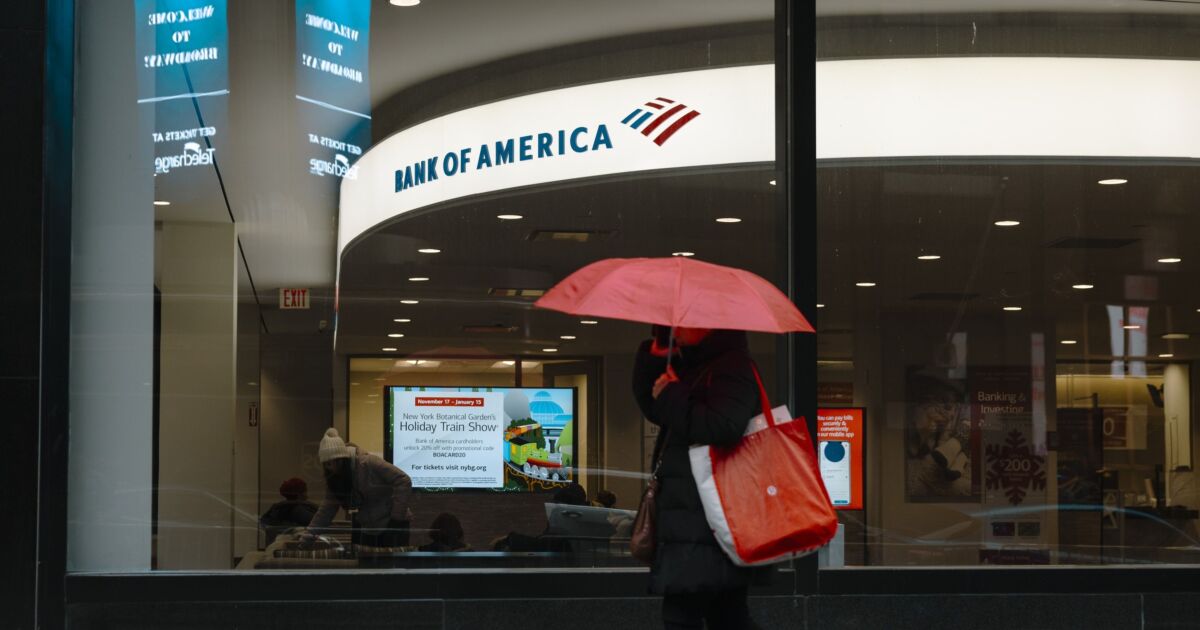
Bank of America's earnings fell short of expectations as the bank's numerous charges in the fourth quarter cut into profit and the firm's fixed-income traders posted a surprise drop in revenue.
Net income fell 56% to $3.14 billion, the company said, a bigger decline than analysts had predicted. The decline in profit was due, in part, to a $2.1 billion special assessment from the Federal Deposit Insurance Corp. and a $1.6 billion charge tied to the finance industry's shift away from the London Interbank Offered Rate benchmark. Expenses also rose as a result.
"Our expense discipline allowed us to continue investing in growth initiatives," Chief Executive Officer Brian Moynihan said in a statement Friday. "Strong capital and liquidity levels position us well to continue to deliver responsible growth in 2024."
Revenue from fixed income, currencies and commodities trading fell 5.8% to $2.21 billion in the fourth quarter, the firm said, as clients grappled with a period of continued high interest rates and geopolitical tensions. Still, overall trading hit a record for the fourth quarter, thanks to a boost from the equities unit. Fixed-income results were impacted by "weaker trading in rates and credit, partially offset by improved trading in mortgages and municipals," the company said in the statement.
Bank of America's results also offer a fresh look at how US consumers and businesses are faring as the Federal Reserve leaves borrowing costs higher for longer. Lenders' balance sheets overall have remained resilient despite higher interest rates, with most firms raising their closely watched net interest income guidance for the full year.
The second-largest US bank said that net interest income, a key source of revenue for the bank, fell 5% to $13.9 billion in the final quarter of last year. Analysts had expected a 5.1% drop for NII, the revenue collected from loan payments minus what depositors are paid.
While interest rates have normalized, NII has come down a over the course of the past year based on deposit pricing and balances drifting down, Chief Financial Officer Alastair Borthwick said on a conference call with reporters.
Shares of Charlotte, North Carolina-based Bank of America dropped 0.7% to $32.93 at 9:37 a.m. in New York. They've declined 4.4% in the past 12 months, compared with a 10% decline for the KBW Bank Index.
The company's loan balances rose to $1.053 trillion at the end of the fourth quarter, up about 1% from a year earlier and more than analysts' estimates of $1.052 trillion. Lending has been a key focus for investors, with high interest rates making borrowing costlier.
At the same time Bank of America's deposits rose to $1.92 trillion, up from $1.88 trillion in the previous quarter, and more than the $1.85 trillion analysts had predicted.
Bank of America's non-interest expenses rose 14% from a year earlier to $17.7 billion. Charges and costs have been a focal point for investors, with persistent inflation putting pressure on spending. Analysts had expected a 6.8% increase to $16.6 billion. Without the FDIC charge, expenses would have totaled $15.6 billion, the bank said.
On the bright side, equities traders posted a surprise beat, generating $1.55 billion in revenue, up 12% from a year earlier. Analysts had predicted that the unit would rise less than 5%. The fourth quarter saw dramatic market swings, as the Federal Reserve's push to quell inflation by keeping interest rates high helped traders.
Equities revenue was "driven by improved trading performance in derivatives," the bank said.
In the firm's investment bank, revenue rose 8.1%, better than analysts expected, helped by a surprise boost from debt issuance. Fees for advising on mergers and acquisitions declined 20%, while revenue from equity and debt issuance increased 5.3% and 42%, respectively.
"We believe our continued investments in bankers around the world" and focus on the middle market in the US is fueling the outperformance, Borthwick said.



